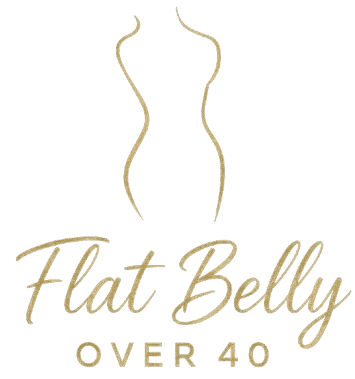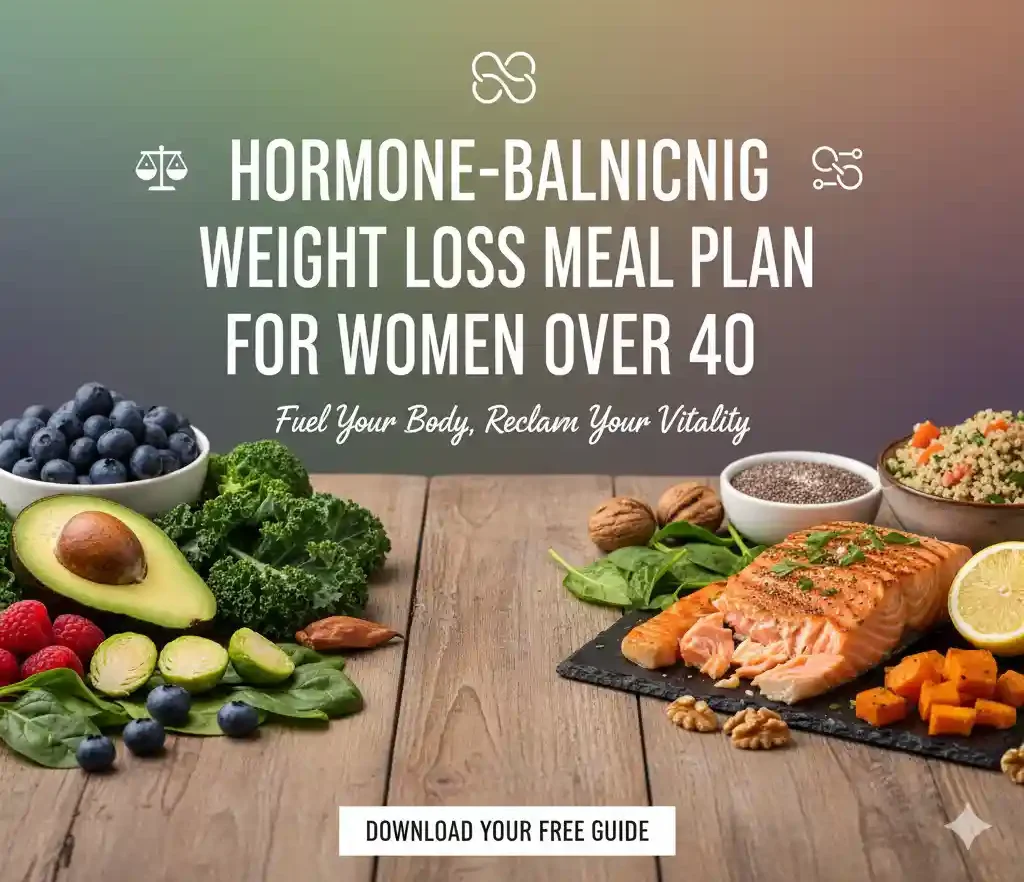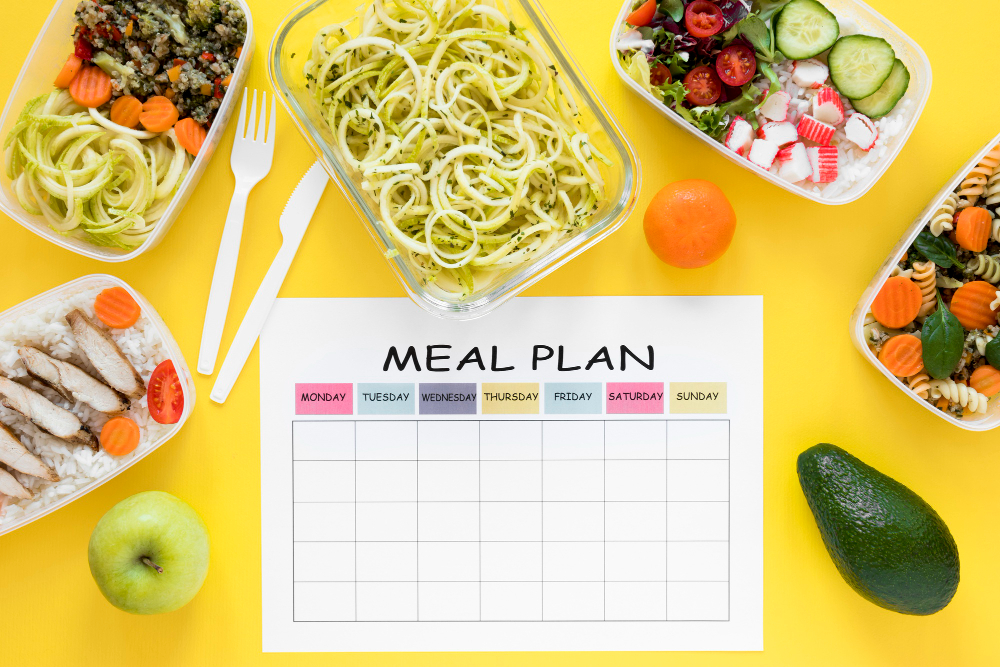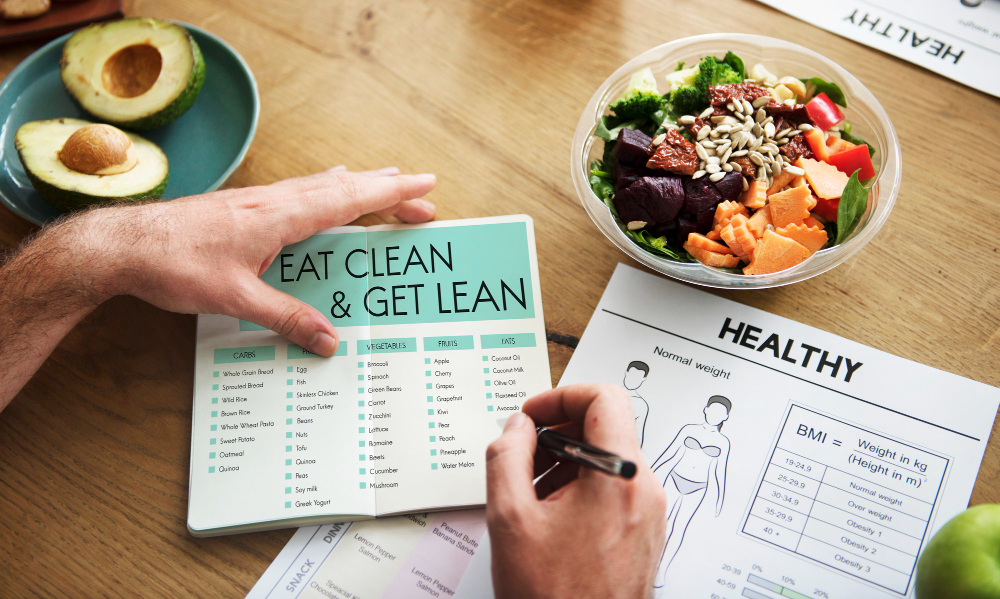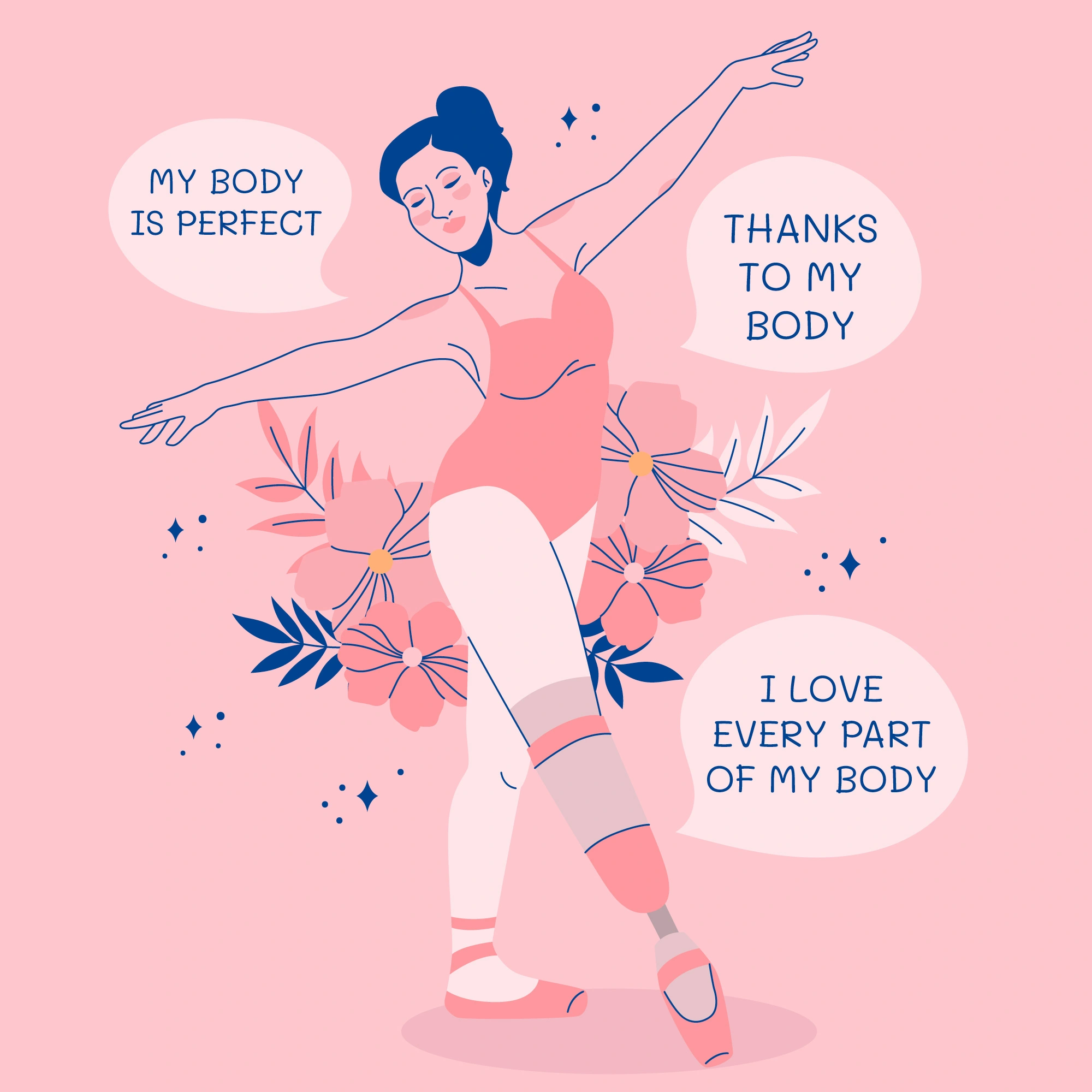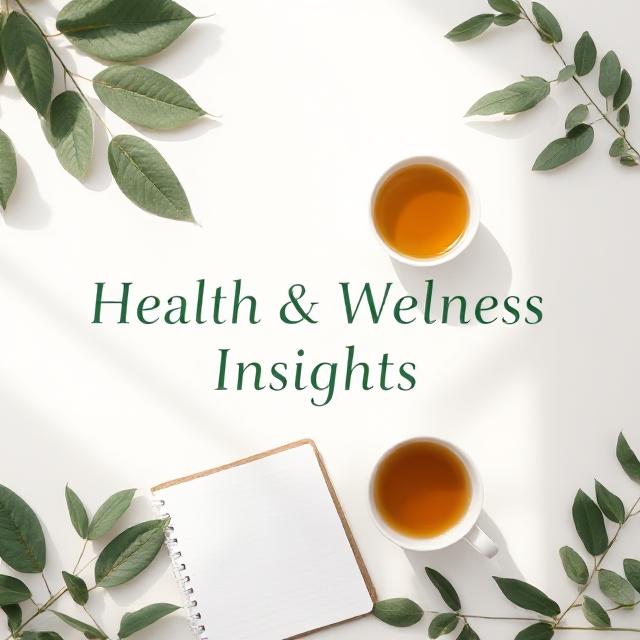Top Natural Ways Women Over 40 Can Lower Blood Pressure & Cholesterol for a Healthier Heart
Naturally Fit. Fearlessly Over 40!
Start Your Flat Belly JourneyTable of Contents
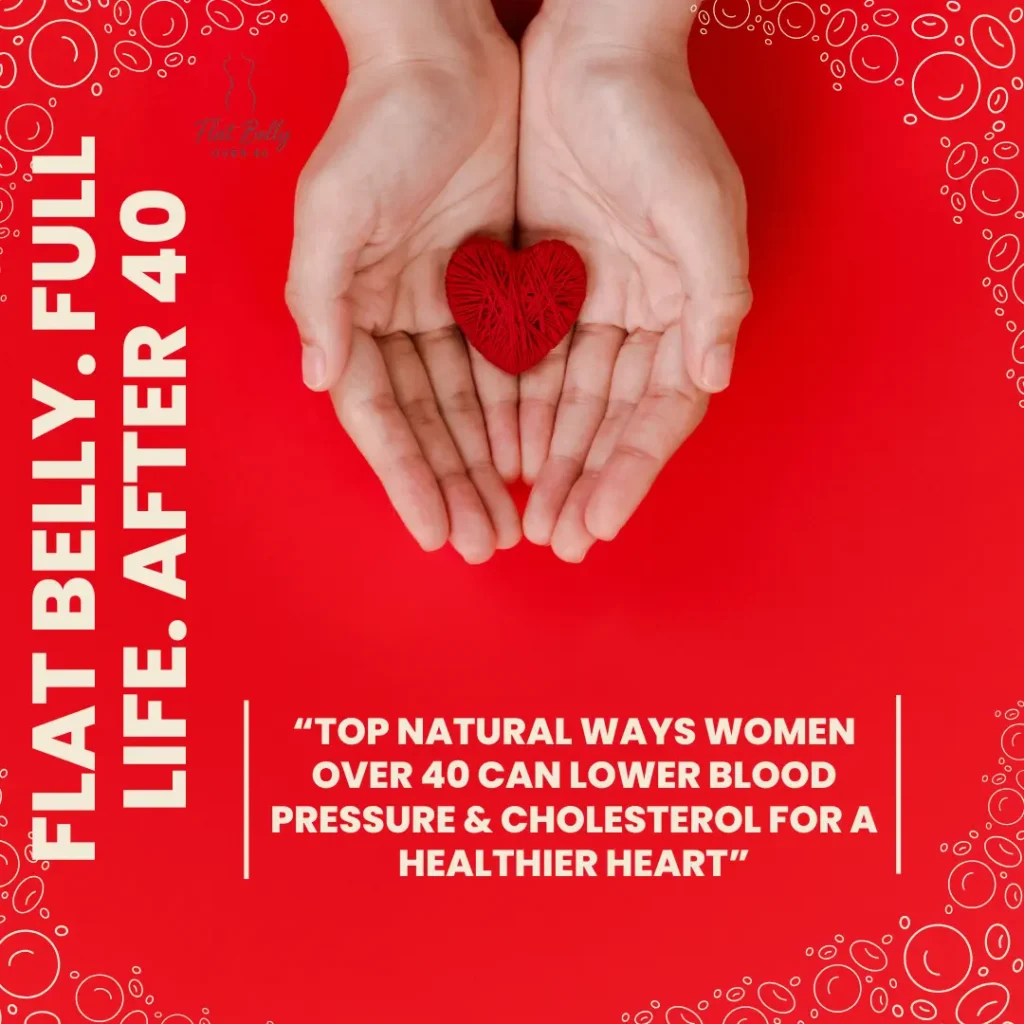
Why Heart Health Matters After 40: A Science-Based Insight for Women Over 40
Heart health is crucial at every stage of life, but for women over 40, it becomes an even more pressing concern. As women age, natural hormonal changes, lifestyle factors, and genetic predispositions increase the risk of cardiovascular diseases (CVD), which remain the leading cause of death globally. Understanding why heart health matters after 40 is essential for taking proactive steps to prevent complications such as high blood pressure, high cholesterol, and heart attacks.
The Science Behind Heart Health Risks After 40
Around the age of 40, women begin to experience significant hormonal shifts, especially a decline in estrogen levels as they approach menopause. Estrogen is known to have a protective effect on the cardiovascular system by helping to maintain healthy blood vessel function and favorable cholesterol levels. Studies have shown that the decline in estrogen is linked to an increase in LDL (“bad”) cholesterol and a decrease in HDL (“good”) cholesterol, elevating the risk for plaque buildup in arteries — a condition known as atherosclerosis (American Heart Association).
Furthermore, blood pressure naturally tends to rise with age due to changes in blood vessel elasticity. Women over 40 often face increased stiffness in their arteries, which can lead to hypertension if not managed properly. High blood pressure is a silent killer, as it damages the heart and arteries over time without obvious symptoms, increasing the risk of heart attacks and strokes.
Lifestyle and Other Risk Factors
Aside from biological changes, lifestyle factors play a critical role in heart health after 40. Sedentary behavior, poor diet, stress, smoking, and excess weight contribute significantly to elevated blood pressure and cholesterol levels. According to the CDC, nearly half of American adults have some form of cardiovascular disease risk factor, and many remain unaware of it (CDC Heart Disease Facts).
Why Early Prevention is Key
Addressing heart health proactively after 40 can dramatically reduce the risk of cardiovascular events later in life. Regular monitoring of blood pressure and cholesterol, coupled with lifestyle changes such as a heart-healthy diet rich in fruits, vegetables, whole grains, and healthy fats, can support natural regulation of these vital markers. Physical activity, stress reduction, and maintaining a healthy weight are equally important.
Conclusion: Take Charge of Your Heart Health Today
For women over 40, understanding the science and risks behind heart health is the first step toward prevention and wellness. By embracing natural ways to support healthy blood pressure and cholesterol, women can protect their hearts and enjoy better quality of life as they age.
- Related Reading:
Check out our other guide on: “Why Belly Fat Increases After 40 – And The 7-Step Natural Formula to Melt It Away”
Major Risks for Women Over 40:
Hormonal Changes:
The natural decline in estrogen during perimenopause and menopause reduces its protective effects on the heart, leading to higher LDL cholesterol and increased artery stiffness.High Blood Pressure (Hypertension):
Aging arteries tend to lose elasticity, which can elevate blood pressure, putting extra strain on the heart and increasing the risk of heart attack and stroke.Unhealthy Cholesterol Levels:
Increased LDL (“bad cholesterol”) and decreased HDL (“good cholesterol”) contribute to plaque buildup in arteries, which can restrict blood flow.Weight Gain and Obesity:
Metabolic slowdown and lifestyle changes often cause weight gain, which is strongly linked to hypertension, diabetes, and heart disease.Sedentary Lifestyle:
Reduced physical activity can weaken cardiovascular health, promote obesity, and worsen cholesterol levels.Stress and Mental Health:
Chronic stress raises cortisol levels, which can increase blood pressure and inflammation, both harmful to heart health.Diabetes Risk:
Women over 40 with diabetes have a higher chance of developing heart disease compared to those without diabetes.Smoking and Alcohol Use:
Both habits significantly increase the risk of cardiovascular diseases by damaging blood vessels and raising blood pressure.
Taking Action: Awareness & Prevention
Being aware of these risks allows women over 40 to make informed lifestyle choices, such as adopting heart-healthy diets, exercising regularly, managing stress, and consulting healthcare providers for regular screenings.
Related Reading:
Check out our other guide on: HIIT vs Strength Training vs Yoga — Which Works Best for Belly Fat After 40?
What is Blood Pressure?
Blood pressure is the force exerted by circulating blood against the walls of your arteries, the vessels that carry blood from your heart to the rest of your body. It is a vital measurement because it indicates how well your heart is pumping and how healthy your arteries are.
How Blood Pressure Works:
Systolic Pressure: This is the higher number in a blood pressure reading. It measures the pressure in your arteries when your heart beats and pumps blood.
Diastolic Pressure: This is the lower number. It measures the pressure in your arteries when your heart is resting between beats.
For example, a normal blood pressure reading is often cited as 120/80 mmHg, where 120 is the systolic and 80 is the diastolic pressure.
Why Blood Pressure Matters:
Maintaining healthy blood pressure is crucial because:
High blood pressure (hypertension) forces your heart to work harder, which can lead to heart disease, stroke, and kidney problems.
Low blood pressure (hypotension) can cause dizziness, fainting, and inadequate blood flow to organs.
Blood pressure can fluctuate throughout the day, but consistently high readings require medical attention to reduce the risk of serious health issues.
What is Cholesterol?
Cholesterol is a waxy, fat-like substance found in every cell of your body. It plays a crucial role in producing hormones, vitamin D, and substances that help you digest food. While your body needs some cholesterol to function properly, too much of it—especially the wrong kind—can harm your heart health.
Types of Cholesterol:
LDL (Low-Density Lipoprotein) – “Bad” Cholesterol
LDL cholesterol can build up on the walls of your arteries, forming plaque. This narrows the arteries and increases the risk of heart disease, heart attack, and stroke.HDL (High-Density Lipoprotein) – “Good” Cholesterol
HDL helps remove excess cholesterol from your bloodstream and carries it back to the liver, where it’s processed and eliminated from the body.Triglycerides:
These are another type of fat in your blood. High triglyceride levels combined with high LDL or low HDL can increase your risk of heart disease.
Why Cholesterol Levels Matter After 40:
As women age—especially after 40 and during menopause—estrogen levels decline, which negatively affects cholesterol levels. This often leads to:
Increased LDL (bad cholesterol)
Decreased HDL (good cholesterol)
Higher triglyceride levels
These changes raise the risk of developing atherosclerosis, a condition where arteries become narrowed and hardened due to plaque buildup.
📌 According to the CDC, nearly 94 million U.S. adults age 20 or older have total cholesterol levels above 200 mg/dL, which is considered borderline high.
Maintaining healthy cholesterol levels through a balanced diet, regular exercise, and lifestyle changes is essential for preventing heart disease—especially for women over 40.
Effects on Heart Health
Uncontrolled blood pressure and unhealthy cholesterol levels can silently damage your cardiovascular system over time. For women over 40, these effects are even more critical due to age-related changes and hormonal shifts.
1. Increased Risk of Heart Attack
When LDL (“bad”) cholesterol builds up in the artery walls, it forms plaque. This narrows the arteries and restricts blood flow to the heart. Over time, a clot can form and completely block the artery — leading to a heart attack (myocardial infarction).
🧠 Fact: According to the American Heart Association, women are more likely to die after their first heart attack than men, partly due to delayed detection and treatment.
2. Stroke and Brain Health
High blood pressure can weaken or damage blood vessels in the brain, increasing the risk of ischemic stroke or brain hemorrhage. Women over 40 are at a higher risk due to combined effects of aging and declining estrogen.
3. Heart Failure
Long-term high blood pressure forces the heart to pump harder, thickening the heart muscles. Eventually, the heart becomes too weak or stiff to pump blood efficiently — leading to heart failure.
4. Atherosclerosis
This is a condition in which cholesterol and fatty deposits accumulate inside the arteries, making them stiff and narrow. Atherosclerosis is a major cause of both heart attacks and strokes and develops silently over years — especially in women with poor lipid profiles and elevated blood pressure.
5. Kidney and Eye Damage
Though not directly part of the heart, high blood pressure and poor circulation can damage tiny blood vessels in the kidneys and eyes, increasing the risk of kidney disease and vision loss, which are both linked to cardiovascular health.
Conclusion
Even without obvious symptoms, high blood pressure and cholesterol silently harm your heart and blood vessels. For women over 40, monitoring these markers and taking preventive action can significantly reduce the risk of life-threatening heart events.
Related Reading:
Check out our other guide on: Protein Power: How Much Protein Women Over 40 Really Need to Lose Belly Fat
Adopt a Heart-Healthy Diet
One of the most effective and natural ways to support heart health—especially for women over 40—is by adopting a heart-healthy diet. As estrogen levels decline with age, the body becomes more susceptible to elevated cholesterol and blood pressure. The right nutrition can help regulate both, reduce inflammation, and protect blood vessels from damage.
What Does a Heart-Healthy Diet Include?
✅ Fruits and Vegetables
Rich in antioxidants, fiber, and essential nutrients, fruits and vegetables help reduce blood pressure and lower bad cholesterol (LDL). Aim for a variety of colors—leafy greens, berries, tomatoes, carrots, and cruciferous veggies like broccoli.
✅ Whole Grains
Whole grains such as oats, quinoa, brown rice, and barley are high in soluble fiber, which helps lower LDL cholesterol. They also help maintain stable blood sugar levels, reducing the risk of metabolic syndrome.
✅ Healthy Fats (Not All Fats Are Bad!)
Incorporate sources of unsaturated fats such as:
Avocados
Extra virgin olive oil
Nuts (almonds, walnuts)
Fatty fish like salmon, sardines, and mackerel (rich in omega-3s)
These fats improve HDL (good cholesterol) and reduce inflammation in the arteries.
✅ Legumes and Plant-Based Proteins
Beans, lentils, chickpeas, and soy products are excellent sources of plant protein and fiber. Studies show they help lower LDL and blood pressure when eaten regularly.
✅ Low-Sodium Foods
Too much salt can raise blood pressure. Avoid processed and packaged foods, and use herbs and spices for flavor instead of salt.
Foods to Avoid (Or Greatly Limit):
🚫 Trans fats (found in fried and packaged snacks)
🚫 Processed meats (like bacon, sausage)
🚫 Sugary beverages and refined carbs (white bread, soda)
🚫 Excess alcohol and added sugars
Bonus Tip: The DASH or Mediterranean Diet
Consider following the DASH (Dietary Approaches to Stop Hypertension) or Mediterranean diet, both scientifically proven to reduce blood pressure, improve cholesterol, and support overall cardiovascular health.
By making small but powerful changes in your daily eating habits, you can significantly reduce your risk of heart disease—and support your body naturally as you age.
Related Reading:
Check out our other guide on: Why Belly Fat Shoots Up After 40 — And How Hormones, Metabolism & Stress Play Together”
Regular Exercise: A Natural Boost for Heart Health After 40
As women age, physical activity becomes more than just a tool for weight management — it becomes a powerful weapon against heart disease, high blood pressure, and poor cholesterol levels. For women over 40, regular exercise can help maintain cardiovascular health, hormonal balance, and emotional well-being.
Why Exercise Matters After 40
After 40, muscle mass naturally declines, metabolism slows, and the risk of chronic conditions like hypertension and high cholesterol increases.
Physical inactivity is one of the top risk factors for heart disease, according to the World Health Organization (WHO).
Exercise helps improve circulation, strengthen the heart, and regulate blood pressure and lipid levels without medication.
Best Heart-Healthy Exercises for Women Over 40
🧘♀️ 1. Brisk Walking or Light Jogging
30 minutes of brisk walking 5 days a week can significantly reduce blood pressure and support heart health. It’s low-impact and easy to start at any age.
🚴♀️ 2. Cycling or Swimming
These are great for cardiovascular endurance without stressing the joints. They improve heart function and lower LDL cholesterol.
🏋️♀️ 3. Strength Training (2–3x per week)
Resistance exercises (using weights or body weight) help maintain muscle mass, improve metabolism, and enhance insulin sensitivity — all of which support heart health.
🧘 4. Yoga and Stretching
Yoga not only improves flexibility and posture but also reduces stress, a major contributor to high blood pressure.
🕺 5. Dance or Aerobic Classes
Fun, effective, and mood-boosting — dancing raises heart rate, burns calories, and supports cardiovascular endurance.
How Much Exercise Is Enough?
The American Heart Association recommends:
At least 150 minutes of moderate-intensity aerobic activity per week, or
75 minutes of vigorous-intensity aerobic activity
Plus 2 days of muscle-strengthening activity
👉 Start slow, especially if you’re new to fitness, and increase gradually. Always consult your healthcare provider before starting a new exercise routine, especially if you have existing conditions.
Key Benefits of Regular Exercise After 40:
✅ Lowers blood pressure naturally
✅ Raises HDL (good cholesterol)
✅ Helps manage weight
✅ Improves blood sugar control
✅ Reduces stress & anxiety
✅ Supports better sleep and energy
By making regular physical activity part of your lifestyle, you’re not just protecting your heart — you’re empowering your entire body and mind to age stronger, healthier, and happier.
Related Reading:
Check out our other guide on: 5 Simple Daily Changes Women Over 40 Make That Melt Belly Fat — No Gym Needed
Manage Stress Effectively: Protect Your Heart Naturally
Stress is more than just a mental burden — it has direct and measurable effects on your heart health. For women over 40, effective stress management is not optional; it’s essential. Hormonal changes, family responsibilities, and work pressures can all combine to raise stress levels, which in turn impact blood pressure, cholesterol, and overall cardiovascular function.
How Stress Affects Your Heart
🧠 When you’re stressed, your body releases hormones like cortisol and adrenaline. These hormones trigger a “fight or flight” response that causes:
Increased heart rate
Tightened blood vessels
Raised blood pressure
Higher levels of inflammation
Over time, chronic stress can lead to hypertension, elevated LDL cholesterol, insulin resistance, and even arterial damage — all of which increase the risk of heart disease.
🩺 According to the American Psychological Association, chronic stress is a major contributor to long-term heart health problems in women, particularly after 40.
Proven Stress-Relief Techniques for Women Over 40
🧘♀️ 1. Deep Breathing & Meditation
Practicing mindfulness or breathing exercises for even 10 minutes a day can lower cortisol levels and calm the nervous system.
🧠 2. Regular Physical Activity
Exercise boosts endorphins (“feel-good” hormones) and helps your body process stress hormones more effectively.
📝 3. Journaling & Gratitude Practice
Writing down your thoughts or practicing gratitude daily has been shown to improve emotional well-being and reduce mental tension.
🛌 4. Prioritize Quality Sleep
Lack of sleep amplifies stress. Aim for 7–8 hours of restorative sleep each night to allow your body to reset and recover.
🫶 5. Social Connection
Spending time with friends, family, or in support groups can reduce feelings of isolation and help manage stress in healthy ways.
🎨 6. Hobbies and Downtime
Make time for yourself—whether it’s reading, gardening, art, or listening to music. These small acts reduce stress and improve mood.
When to Seek Help
If you feel overwhelmed regularly or experience symptoms like anxiety, panic attacks, or emotional exhaustion, consider talking to a licensed therapist or counselor. Mental health and heart health go hand in hand—especially during and after menopause.
Bottom Line
Managing stress is not just about feeling better — it’s about living longer and stronger. For women over 40, developing healthy stress-reduction habits can naturally lower blood pressure, improve cholesterol levels, and significantly reduce the risk of heart disease.
Related Reading:
Check out our other guide on: Weight Loss for Busy Professionals: 12 Proven Strategies to Burn Fat and Boost Energy (Especially for Women Over 40)
Reduce Sodium Intake: A Simple Step Toward a Healthier Heart
Too much sodium (salt) in your diet can silently raise your blood pressure — one of the biggest risk factors for heart disease. For women over 40, who already face age-related changes in blood vessels and hormone levels, reducing sodium intake becomes even more important for maintaining healthy blood pressure and protecting the heart.
Why Is Sodium Harmful?
Sodium causes the body to retain excess water, which puts extra pressure on blood vessels and forces the heart to work harder. Over time, this leads to:
Hypertension (High Blood Pressure)
Increased risk of heart attack and stroke
Kidney strain and fluid retention
📊 According to the Centers for Disease Control and Prevention (CDC), most Americans consume over 3,400 mg of sodium per day, while the recommended limit is just 2,300 mg — and ideally 1,500 mg for people with high blood pressure.
Top Sources of Hidden Sodium
Even if you don’t add extra salt to your food, you may still be consuming too much from processed or packaged items like:
Canned soups and vegetables
Frozen meals and instant noodles
Deli meats and sausages
Breads, crackers, and snacks
Cheese and salty condiments (soy sauce, ketchup)
Smart Tips to Reduce Sodium Naturally
🥗 Read Nutrition Labels:
Look for “low-sodium,” “no salt added,” or items with less than 140 mg per serving.
🍳 Cook Fresh at Home:
Preparing meals from scratch allows you to control exactly how much salt goes in.
🧂 Use Herbs & Spices Instead of Salt:
Flavor your food with garlic, lemon, black pepper, cumin, basil, rosemary, or turmeric — these add taste without sodium.
🚫 Avoid Processed & Packaged Foods:
Choose whole foods like fresh fruits, vegetables, whole grains, and lean proteins.
💧 Stay Hydrated:
Water helps flush out excess sodium and supports blood pressure regulation.
Bottom Line
Reducing sodium intake is one of the easiest and most effective ways to support heart health naturally — especially for women over 40. By making mindful food choices and cutting back on salt, you can take a powerful step toward lower blood pressure, healthier arteries, and a stronger heart.
Related Reading:
Check out our other guide on:Natural Energy Boosting Tips for Women Over 40 Feel Alive All Day!
Increase Fiber Intake: A Natural Shield for Your Heart After 40
If you’re a woman over 40 looking to improve heart health naturally, fiber should be your best friend. Dietary fiber—especially soluble fiber—helps reduce cholesterol, stabilize blood sugar, and support healthy weight management. All of these are crucial for protecting the heart during midlife and beyond.
Why Fiber Matters for Heart Health
🔬 Soluble fiber binds to cholesterol particles in the digestive system and helps remove them before they enter the bloodstream.
📉 It can help lower LDL (“bad”) cholesterol levels, a major risk factor for heart disease.
🩸 It also slows digestion, leading to better blood sugar control and reduced insulin spikes, which further support cardiovascular health.
✅ According to the American Heart Association, a high-fiber diet is linked to a significantly lower risk of heart disease and stroke.
Types of Fiber
Soluble Fiber: Dissolves in water and helps lower cholesterol (found in oats, beans, lentils, apples, citrus fruits).
Insoluble Fiber: Adds bulk to stool and supports digestion (found in whole grains, vegetables, seeds).
Both types are important, but soluble fiber has the most direct impact on heart health.
Best Fiber-Rich Foods for Women Over 40
🥣 Oats & Oat Bran – Start your day with oatmeal to boost soluble fiber intake.
🥦 Vegetables – Especially broccoli, carrots, and leafy greens.
🍎 Fruits with skin – Apples, berries, pears, oranges.
🥜 Nuts & Seeds – Chia seeds, flaxseeds, almonds.
🌾 Whole Grains – Brown rice, quinoa, barley, whole wheat bread.
🥫 Legumes – Lentils, black beans, chickpeas.
Daily Fiber Recommendation
Women over 40 should aim for 25–30 grams of fiber per day from food sources.
Increase fiber gradually and drink plenty of water to avoid bloating or digestive discomfort.
Bottom Line
Increasing fiber intake is a simple yet powerful way to lower cholesterol, manage weight, and support a healthy heart — all without medication. For women over 40, it’s a natural step toward long-term cardiovascular health and well-being.
Related Reading:
Check out our other guide on:Top Anti‑Inflammatory Foods to Reduce Belly Fat for Women Over 40
Incorporate Healthy Fats: Support Heart Health the Right Way
For years, dietary fat was blamed for heart disease. But now science is clear — not all fats are bad, and in fact, healthy fats are essential for heart, brain, and hormone health, especially for women over 40.
At this stage of life, as estrogen levels decline, the risk of high cholesterol, inflammation, and arterial stiffness increases. Incorporating the right kinds of fats into your diet can help reduce these risks naturally.
What Are Healthy Fats?
✅ Monounsaturated Fats
These fats help lower LDL (bad) cholesterol and raise HDL (good) cholesterol.
Found in:
🥑 Avocados
🫒 Olive oil
🥜 Almonds, cashews, peanuts
✅ Polyunsaturated Fats (Omega-3 & Omega-6)
These fats are essential for brain and heart function. Omega-3 fatty acids, in particular, reduce inflammation, prevent blood clots, and support healthy blood vessels.
Found in:
🐟 Fatty fish (salmon, mackerel, sardines)
🌰 Walnuts, flaxseeds, chia seeds
🌻 Sunflower and soybean oil (for Omega-6)
Benefits of Healthy Fats for Women Over 40
💓 Lower Blood Pressure
💪 Reduce Inflammation in Arteries
🧠 Improve Cognitive Function & Mood
🩸 Support Healthy Cholesterol Levels
🔄 Enhance Hormone Production (especially post-menopause)
📊 According to the Harvard School of Public Health, replacing saturated fats with unsaturated fats can significantly reduce the risk of heart disease.
Fats to Avoid
❌ Trans Fats – Found in fried foods, baked goods, and processed snacks. They raise LDL and lower HDL — the worst combination for heart health.
❌ Excess Saturated Fat – Found in red meat, full-fat dairy, and butter. Limit these to occasional servings and focus more on plant-based fat sources.
How to Include Healthy Fats Daily
🥗 Drizzle olive oil on salads
🥑 Add avocado slices to toast or smoothies
🐟 Eat fatty fish 2–3 times per week
🥜 Snack on a handful of mixed nuts or seeds
🍳 Cook with heart-healthy oils like avocado or canola oil
Bottom Line
Healthy fats aren’t just safe — they’re essential. For women over 40, including the right fats in your diet can naturally reduce blood pressure, improve cholesterol, and protect your heart for years to come.
Related Reading:
Check out our other guide on:How Menopause Affects Fat Distribution And What You Can Do About Belly Fat After 40
Eat Smart After 40: How to Avoid Trans Fats & Sugar for Healthier Years Ahead
As women over 40, our body’s metabolism, hormone levels, and cardiovascular resilience change. That makes it even more important to adopt a diet that protects against chronic disease. Two dietary villains to eliminate or sharply reduce: trans fats and added sugar.
Why Trans Fats Are Dangerous (Especially After 40)
Trans fats are the “bad fats” you’ll often find in partially hydrogenated oils. These industrially produced fats raise LDL (“bad”) cholesterol and lower HDL (“good”) cholesterol, promoting inflammation and clogging arteries. www.heart.org+3The Nutrition Source+3Mayo Clinic+3
The World Health Organization states that over 278,000 premature deaths globally each year are linked to industrial trans fat intake. World Health Organization Moreover, no safe level of artificial trans fat is known, so the best strategy is to avoid them altogether. Pan American Health Organization+1
For a woman over 40, the stakes are higher: the decline in estrogen influences blood vessel health, lipid metabolism, and risk of cardiovascular disease. A diet with trans fats accelerates those risks.
Practical tips to avoid trans fats:
Check food labels and avoid any product listing “partially hydrogenated oils” or “hydrogenated fats,” even if the label claims “0 g trans fats.” Mayo Clinic+2WebMD+2
Limit intake of fried fast food, packaged baked goods, margarine, processed snacks, and commercial doughnuts. www.heart.org+2Mayo Clinic+2
Use healthier fats like extra virgin olive oil, avocado oil, nuts, seeds, and fatty fish. The Nutrition Source+2Pan American Health Organization+2
Sugar: How It Works Against Women Over 40
Added sugar (in sweets, sodas, sweetened yogurts, desserts) places a heavy burden on metabolism. After 40, insulin sensitivity often decreases; too much sugar can lead to weight gain, type 2 diabetes, fatty liver, and inflammation. AARP+2The Times of India+2
The American Heart Association recommends limiting added sugar to no more than 6 teaspoons (≈ 25 grams) per day for women. Women’s Health Some studies link even moderate sugar consumption with higher risk of heart disease, insulin resistance, and obesity.
Tips for cutting sugar:
Read labels carefully. Sugar hides under names like sucrose, glucose, fructose, corn syrup, dextrose, maltose, etc.
Choose whole fruits instead of fruit juices or syrups. The fiber in whole fruit slows absorption of sugar.
Replace sugary drinks (sodas, sweetened coffee/tea) with water, herbal teas, or plain sparkling water.
Use natural alternatives sparingly, like stevia, monk fruit, or small amounts of raw honey—but always count them as added sugar.
Balance every snack or meal: pair carbohydrates with protein and healthy fats to blunt sugar spikes.
Sample Plate for a Healthy Woman Over 40
| Meal | What It Looks Like |
|---|---|
| Breakfast | Greek yogurt (unsweetened) + berries + chopped nuts |
| Lunch | Mixed greens salad, grilled salmon or tofu, olive oil & lemon dressing |
| Snack | A piece of fruit + handful of almonds |
| Dinner | Stir‑fry vegetables + lean protein + a small portion of quinoa or brown rice |
| Dessert (if desired) | Dark chocolate (≥ 70% cocoa) or a few dates (used sparingly) |
This kind of diet is food rich, not food deprived. It emphasizes whole, minimally processed foods and avoids the hidden dangers of trans fats and refined sugars.
Final Thoughts
For women over 40, eliminating trans fats and minimizing added sugar is not just a health fad — it’s a science‑backed strategy to guard your heart, metabolism, and longevity. Replace those dangerous fats and empty sugars with real, nutrient‑dense foods. Over time, you’ll likely feel more energetic, maintain better weight control, and reduce risks of chronic diseases.
Related Reading:
Check out our other guide on:
Best Belly Fat Workouts for Women Over 40 You Can Do at Home
🌿 Use Plant Sterols and Stanols: A Natural Way to Lower Cholesterol for Women Over 40
As women over 40, it becomes increasingly important to take proactive steps toward heart health. Hormonal changes, especially a drop in estrogen, can raise LDL (bad) cholesterol levels and increase the risk of heart disease. One safe and science-backed way to fight this naturally is by using plant sterols and stanols.
But what are they? How do they work? And why are they especially beneficial for women over 40?
Let’s explore.
🧬 What Are Plant Sterols and Stanols?
Plant sterols and stanols are substances found naturally in small amounts in fruits, vegetables, nuts, seeds, and whole grains. They are structurally similar to cholesterol and compete with it for absorption in the digestive system.
In simple terms: They block cholesterol from entering your bloodstream.
📌 Fun Fact: The average diet contains about 200–400 mg of plant sterols per day — far below the effective dose.
❤️ Why Are They Important for Women Over 40?
After 40, women are at higher risk for:
Elevated LDL cholesterol
Atherosclerosis (plaque buildup in arteries)
Cardiovascular disease
Menopause-related metabolic changes
Because plant sterols and stanols lower LDL cholesterol by 7–10% without affecting HDL (good cholesterol), they are ideal for women over 40 who want to reduce heart risks without medication (or alongside it, with doctor supervision).
👉 According to the American Heart Association and FDA, consuming 2 grams daily of plant sterols or stanols is effective in lowering cholesterol.
🔬 Science-Backed Results
Numerous studies have confirmed their effectiveness:
A 2019 meta-analysis published in Nutrients found that plant sterols/stanols reduce LDL cholesterol by 8–10% within 3–4 weeks when consumed at recommended levels.
They are safe for long-term use and are recommended by the National Cholesterol Education Program.
“Plant stanol and sterol esters are among the few dietary components that have a proven LDL cholesterol-lowering effect.” – Harvard Health
👉 Harvard Health Link
🍊 Where to Find Plant Sterols and Stanols
Although naturally present in some foods, you’d need to eat very large amounts to get 2 grams/day. That’s why fortified foods are the best option.
Common fortified sources:
Margarines & spreads (e.g., Benecol®, Flora ProActiv®)
Fortified yogurt drinks
Fortified orange juice
Some granola bars and cereals
🛒 Shopping tip: Look for labels that say “Contains plant sterols” or “Helps lower cholesterol.”
🥗 How to Use Them Daily
Sample Daily Plan for Women Over 40:
| Meal | Idea |
|---|---|
| Breakfast | Oatmeal + fortified orange juice with sterols |
| Snack | Whole grain toast with sterol-enriched spread |
| Lunch | Salad with avocado, nuts, and sterol yogurt drink |
| Dinner | Grilled fish with vegetables and a small portion of brown rice |
✅ Combine plant sterols with a healthy, low-saturated-fat diet for best results.
⚠️ Are There Any Side Effects?
Plant sterols and stanols are generally safe for most people. However:
Not recommended for pregnant or breastfeeding women without medical advice.
People with a rare condition called sitosterolemia should avoid them.
They may slightly reduce the absorption of fat-soluble vitamins (A, D, E, K) — so ensure a balanced diet.
Always talk to your doctor if you’re already on cholesterol medication.
🎯 Final Takeaway
For women over 40, managing cholesterol is no longer optional — it’s essential.
Using plant sterols and stanols is a natural, science-backed, and effective strategy to lower LDL cholesterol and support heart health.
🌿 Just 2 grams a day can make a significant difference in just a few weeks.
Add them to your routine and take control of your health — one smart food choice at a time.
Related Reading:
Check out our other guide on:7 Night Habits That Melt Belly Fat While You Sleep(For Women Over 40)
⚖️ How to Maintain a Healthy Weight After 40: A Guide for Women Over 40
As women over 40, maintaining a healthy weight becomes more challenging — but also more important than ever. Hormonal changes, muscle loss, and a slower metabolism can all contribute to unwanted weight gain. But with the right strategies, you can maintain a healthy weight, boost energy, and reduce the risk of chronic disease.
This science-backed guide is designed specifically for women over 40 who want to manage their weight in a healthy, sustainable way.
🧬 Why Weight Maintenance Gets Harder After 40
After the age of 40, several biological changes impact body weight:
Hormonal Shifts: Estrogen levels decline, which can lead to fat being stored around the abdomen.
Slower Metabolism: Muscle mass decreases with age, and since muscle burns more calories than fat, your metabolism slows down.
Insulin Resistance: Blood sugar control becomes less efficient, increasing the risk of fat gain.
Increased Stress & Sleep Issues: Cortisol (stress hormone) and poor sleep can both increase appetite and cravings.
🎯 Healthy Weight Goals for Women Over 40
Maintaining a healthy weight isn’t about being skinny — it’s about reducing your risk of:
Heart disease
Type 2 diabetes
Joint pain
Breast and other cancers
Fatigue and mood swings
A Body Mass Index (BMI) between 18.5 and 24.9 is considered healthy, but body composition and waist circumference also matter. Aim for a waist size under 35 inches to reduce health risks.
✅ Strategies to Maintain a Healthy Weight
1. Prioritize Protein
Protein preserves lean muscle mass and increases satiety. Include 20–30g of protein in every meal.
Best sources for women over 40:
Eggs, chicken, turkey, tofu
Greek yogurt, cottage cheese
Legumes, quinoa, and lentils
Protein shakes (low-sugar, plant-based or whey)
2. Strength Training Is Essential
Cardio is great, but resistance training builds muscle and boosts metabolism.
🏋️♀️ Aim for:
2–3 strength sessions per week
Focus on large muscle groups: legs, back, core
Bodyweight exercises, dumbbells, or resistance bands
3. Eat More Fiber
Fiber helps you feel full and supports digestive health.
High-fiber foods:
Leafy greens
Oats, barley, and brown rice
Berries, apples, pears
Beans and lentils
4. Watch Sugar and Processed Foods
Added sugars and ultra-processed foods lead to fat storage, especially around the belly.
📌 Tip: Choose whole foods 80% of the time and avoid sugary drinks, baked goods, and packaged snacks.
5. Stay Hydrated
Thirst is often mistaken for hunger. Water also supports metabolism and digestion.
💧 Aim for:
8–10 glasses per day
More if you’re active or live in a hot climate
6. Get Quality Sleep
Poor sleep disrupts hunger hormones (ghrelin & leptin), leading to increased cravings.
😴 Tips for better sleep:
Go to bed and wake up at the same time daily
Avoid screens 1 hour before bed
Limit caffeine after 2 PM
7. Manage Stress
Chronic stress raises cortisol levels, promoting fat storage.
🧘♀️ Try:
Deep breathing exercises
Yoga or stretching
Journaling
Nature walks
🥗 Sample One-Day Weight Maintenance Plan
| Time | Meal |
|---|---|
| Breakfast | Scrambled eggs + sautéed spinach + whole grain toast |
| Snack | Greek yogurt + chia seeds + blueberries |
| Lunch | Grilled chicken salad with olive oil dressing |
| Snack | Apple + 10 almonds |
| Dinner | Grilled salmon + quinoa + roasted vegetables |
| Optional | Herbal tea or a square of dark chocolate |
📌 Final Thoughts
Maintaining a healthy weight as a woman over 40 doesn’t require crash diets or extreme exercise. It’s about building smart, sustainable habits that align with your body’s changing needs.
Focus on:
Protein
Movement
Stress and sleep
Whole foods over processed options
🌟 The goal isn’t perfection — it’s consistency.
Start small, stay consistent, and give your body the respect and care it deserves.
🚭 Quit Smoking & Limit Alcohol: Essential Health Moves for Women Over 40
 Turning 40 is a powerful milestone — a time to reflect, reset, and realign your health goals. For women over 40, making smarter lifestyle choices can significantly reduce the risk of chronic disease, improve energy, and enhance quality of life.
Turning 40 is a powerful milestone — a time to reflect, reset, and realign your health goals. For women over 40, making smarter lifestyle choices can significantly reduce the risk of chronic disease, improve energy, and enhance quality of life.
Two of the most impactful changes you can make?
Quit smoking and limit alcohol consumption.
Both habits are strongly linked to serious health problems — and the risks only increase with age. Here’s why now is the right time to take action, backed by science.
🚬 Why Women Over 40 Should Quit Smoking — Immediately
Smoking is the leading cause of preventable death worldwide. For women over 40, the health risks are magnified due to age-related changes in hormones, metabolism, and immune function.
🔥 How Smoking Affects Women Over 40:
Increases risk of heart disease and stroke — already higher after menopause
Speeds up bone loss, increasing risk of osteoporosis
Raises risk of lung cancer and COPD
Accelerates skin aging and causes premature wrinkles
Interferes with hormone therapy and worsens menopause symptoms
According to the CDC, women who smoke are twice as likely to have a heart attack as non-smokers — and that risk climbs after 40.
💡 Good news: Within 1 year of quitting, your heart disease risk drops by 50%. Within 5 years, stroke risk is similar to that of a non-smoker.
✅ Tips to Quit Smoking:
Use nicotine replacement therapy (patches, gum, lozenges)
Try prescription medications like varenicline or bupropion
Get support: Join a quit-smoking group or talk to your doctor
Avoid triggers: Stay away from smoking environments during cravings
Replace the habit: Try chewing sugar-free gum, deep breathing, or walking
👉 Resource: Smokefree Women – Support from the National Cancer Institute
🍷 Why Women Over 40 Should Limit Alcohol
Moderate drinking may seem harmless, but even small amounts of alcohol can have outsized effects on women over 40.
🧠 How Alcohol Affects Your Body After 40:
Increases breast cancer risk – even 1 drink per day
Raises blood pressure and cholesterol
Disrupts sleep and worsens hot flashes
Triggers weight gain – alcohol has empty calories
Impacts liver health, which becomes more sensitive with age
According to the American Cancer Society, no amount of alcohol is completely safe. For women, 1 drink per day is the absolute upper limit — but less is better.
✅ Healthier Drinking Habits:
Set limits – Aim for no more than 1 drink per day (or none at all)
Choose lower-alcohol options – like spritzers or light wine
Drink slowly and eat while drinking
Plan alcohol-free days every week
Replace alcohol with herbal teas, sparkling water, or mocktails
🌟 Benefits You’ll Notice When You Quit Smoking & Cut Back on Alcohol
Within weeks or months, women over 40 often notice:
Improved breathing and energy
Better sleep quality
Fewer hot flashes and night sweats
Clearer skin
Weight loss or easier weight maintenance
Reduced anxiety and mood swings
Lower risk of cancer, heart disease, and liver issues
These changes are not just physical — they’re emotional and mental, too.
💪 You’re Not Alone — and It’s Not Too Late
Quitting smoking and reducing alcohol may feel hard, but it’s never too late. Women in their 40s, 50s, 60s and beyond have successfully made these changes and reported life-changing benefits.
It starts with one choice — one day — one habit at a time.
✨ Final Thoughts
For women over 40, taking control of your health is one of the best investments you can make. Quitting smoking and limiting alcohol are two of the most powerful ways to protect your heart, brain, bones, and overall longevity.
🌿 You deserve to feel strong, clear-headed, and healthy — now and in the decades to come.
🌙 Get Quality Sleep: Why It Matters More Than Ever for Women Over 40

As women over 40, your sleep isn’t just about rest — it’s a foundation for hormonal balance, heart health, brain function, and even weight management. Yet, for many women in their 40s and beyond, getting quality sleep becomes harder due to shifting hormones, stress, and lifestyle changes.
If you’re waking up tired, struggling to fall asleep, or experiencing restless nights, you’re not alone — and the good news is, you can fix it naturally.
🧠 Why Sleep Gets Worse After 40
Around age 40, many women start to experience:
Decreased estrogen and progesterone
Night sweats and hot flashes
Increased stress and anxiety
More frequent nighttime awakenings
Lighter sleep overall
According to the National Sleep Foundation, over 60% of women over 40 report problems sleeping — especially during perimenopause and menopause.
But poor sleep isn’t just frustrating — it increases your risk of:
Weight gain
Type 2 diabetes
Depression and mood swings
Memory issues
Heart disease and high blood pressure
💤 Getting 7–9 hours of deep, restorative sleep every night is essential for your physical and emotional health after 40.
🌿 How to Get Better Sleep Naturally: 7 Proven Tips for Women Over 40
1. Stick to a Consistent Sleep Schedule
Go to bed and wake up at the same time every day — even on weekends. This helps reset your internal body clock and improves sleep quality.
2. Limit Caffeine and Alcohol
Caffeine (even early in the day) and alcohol (especially in the evening) can disrupt your deep sleep cycles and lead to frequent wakeups.
⚠️ Tip: Avoid caffeine after 2 PM and limit alcohol to no more than 1 drink (or none).
3. Create a Cool, Dark, Quiet Bedroom
Your bedroom should be a sleep sanctuary:
Temperature: 60–67°F (16–19°C)
Use blackout curtains
Use a white noise machine if needed
Avoid screens before bed
4. Manage Stress and Anxiety
Stress is a major sleep killer, especially for women balancing work, family, and hormonal shifts.
Try:
Deep breathing
Guided meditation
Gentle yoga or stretching
Journaling before bed
5. Avoid Big Meals Before Bed
Digesting a heavy dinner or late-night snack can interrupt your sleep. Finish eating at least 2–3 hours before bedtime.
6. Exercise — But Not Too Late
Regular exercise improves sleep, but vigorous activity too close to bedtime can stimulate your nervous system. Aim for:
30 minutes of walking, yoga, or strength training — ideally before evening.
7. Consider Natural Sleep Aids (With Caution)
Some women over 40 benefit from:
Melatonin supplements (low dose: 0.5–1 mg)
Magnesium glycinate or citrate
Herbs like chamomile, valerian, or ashwagandha
⚠️ Always check with a doctor before starting supplements — especially if you’re on medication or hormone therapy.
🧘♀️ Sample Evening Routine for Women Over 40
| Time | Habit |
|---|---|
| 8:00 PM | Turn off all screens and dim the lights |
| 8:15 PM | Herbal tea (e.g., chamomile or lavender) |
| 8:30 PM | Light stretching or journaling |
| 9:00 PM | Take magnesium or melatonin (if needed) |
| 9:30 PM | Read a book or listen to calming music |
| 10:00 PM | Lights out – sleep time! |
🌟 Final Thoughts
For women over 40, getting quality sleep is non-negotiable. It impacts your weight, mood, memory, heart, and hormones. Instead of accepting poor sleep as part of aging, take back control with small, powerful habits that work with your body — not against it.
🌙 Prioritize sleep like you would your diet or exercise. It’s the ultimate anti-aging, stress-reducing, energy-boosting tool.
🩺 Regular Health Checkups: A Lifesaving Habit for Women Over 40
Turning 40 marks a new chapter — one where preventive health becomes more important than ever. For women over 40, regular health checkups are not just routine appointments — they are powerful tools for early detection, disease prevention, and long-term well-being.
🧬 Why It Matters After 40
As women age, the risk for several chronic conditions increases:
Heart disease
Breast and cervical cancer
Osteoporosis
Type 2 diabetes
Thyroid disorders
Many of these conditions show no symptoms in the early stages. Regular screenings help detect issues before they become serious, when they’re easiest to treat.
✅ Key Checkups Every Woman Over 40 Should Schedule
Blood Pressure & Cholesterol: Every 1–2 years
Blood Sugar/Diabetes Screening: Every 3 years (or yearly if at risk)
Mammogram: Every 1–2 years starting at age 40
Pap Smear & HPV Test: Every 3–5 years
Bone Density Test (DEXA): At age 50 or earlier if menopausal
Thyroid Function Test: As recommended by your doctor
Colorectal Screening: Start by age 45
🩺 Tip: Keep a health journal or digital record of your screenings, test results, and follow-ups.
🌟 Final Thought
Women over 40 often focus on caring for others — but your health matters too. Prioritize regular checkups as a form of self-respect and self-care. Early action can add years to your life — and life to your years.
📅 Don’t wait for symptoms. Schedule your next checkup today.
💊 Helpful Supplements for Women Over 40: What You Really Need
As women over 40, your body begins to go through significant changes — from hormonal shifts to slower metabolism and reduced bone density. While a healthy diet should always come first, targeted supplements can help fill nutritional gaps and support long-term wellness.
Here are the most helpful supplements for women in this stage of life, backed by science.
✅ 1. Calcium & Vitamin D
After 40, bone loss accelerates — especially after menopause.
Calcium supports bone strength
Vitamin D helps calcium absorption and boosts immunity
🔎 Recommended: 1,000–1,200 mg calcium + 600–800 IU vitamin D daily
✅ 2. Magnesium
Supports bone health, reduces anxiety, improves sleep, and helps regulate blood sugar.
Women over 40 often have low magnesium due to stress or poor diet.
💡 Look for: Magnesium glycinate or citrate (better absorption)
✅ 3. Omega-3 Fatty Acids
Found in fish oil or algae oil, omega-3s support heart, brain, and joint health. They also help reduce inflammation and support hormone balance.
🐟 Tip: Choose a supplement with EPA & DHA, at least 500 mg total
✅ 4. Vitamin B12
Absorption decreases with age. B12 supports energy, nerve function, and mood — especially for women on plant-based diets.
🧠 Low B12 can mimic dementia symptoms — don’t overlook it!
🌟 Final Thought
For women over 40, the right supplements can bridge the gap between diet and optimal health. Always consult your doctor before starting any supplement — especially if you’re on medications or managing health conditions.
🧴 Supplement smart — not more.
🌿 Herbal Remedies for Women Over 40: Natural Support for Health and Wellness
As women over 40 navigate hormonal changes, stress, and shifting energy levels, many turn to herbal remedies to support their health naturally. While not a replacement for medical care, certain herbs can complement your wellness routine by easing symptoms and promoting balance.
Here are some well-researched herbal remedies ideal for women in this age group.
✅ 1. Black Cohosh
Widely used for menopause symptoms like hot flashes and night sweats. Studies suggest it may help reduce the frequency and intensity of these symptoms.
✅ 2. Ashwagandha
An adaptogen that helps manage stress and anxiety, supports energy, and may improve sleep quality — all important for women facing midlife challenges.
✅ 3. Red Clover
Contains natural plant estrogens called isoflavones. It may support bone health and reduce hot flashes, though more research is needed.
✅ 4. Ginger
Known for its anti-inflammatory properties, ginger helps with digestive issues, reduces nausea, and supports joint health.
✅ 5. Chamomile
A gentle herb to promote relaxation and restful sleep. Drinking chamomile tea before bed can help calm the mind and soothe anxiety.
⚠️ Important Tips
Always consult your healthcare provider before starting any herbal remedies, especially if you’re on medications or have chronic conditions.
Quality matters — choose standardized extracts from reputable brands.
Herbal remedies work best combined with a healthy lifestyle.
🌟 Final Thought
For women over 40, herbal remedies can offer natural, gentle support during life’s transitions. Used wisely, they’re a valuable tool in your wellness toolkit.
💪 Staying Motivated: How Women Over 40 Can Keep Going Strong
For women over 40, staying motivated—whether it’s for fitness, healthy eating, or self-care—can be a real challenge. Hormonal changes, busy schedules, and shifting priorities often make it tough to stay consistent. But motivation is key to maintaining health and vitality during this important stage of life.
Here’s how you can stay motivated and keep your wellness goals on track.
🔑 1. Set Realistic, Meaningful Goals
Focus on goals that matter to YOU, like having more energy to play with your kids or improving your mood. Break big goals into smaller, achievable steps to avoid overwhelm.
🔑 2. Celebrate Small Wins
Every healthy meal, workout, or restful night counts. Celebrate these moments—they build momentum and boost confidence.
🔑 3. Find Your Tribe
Connect with friends, join online communities, or attend local groups focused on health for women over 40. Social support keeps motivation high and makes the journey fun.
🔑 4. Mix It Up
Routine can become boring. Try new workouts, recipes, or mindfulness techniques to keep things fresh and exciting.
🔑 5. Track Your Progress
Use apps, journals, or photos to see how far you’ve come. Visual progress is a powerful motivator.
🌟 Final Thought
Motivation isn’t about being perfect every day—it’s about persistence. For women over 40, staying motivated means embracing progress, learning from setbacks, and remembering why you started.
🔥 Keep your eyes on the prize: a healthier, happier you.
🩺 When to Consult a Healthcare Professional: A Guide for Women Over 40
As women over 40, your health needs evolve — and knowing when to consult a healthcare professional is vital to staying healthy and preventing serious issues.
Early intervention often leads to better outcomes, so paying attention to your body and symptoms is key.
🚨 Signs You Should See a Doctor
1. Unexplained Weight Changes
Sudden weight loss or gain can signal thyroid problems, diabetes, or other conditions.
2. Persistent Fatigue
Feeling exhausted despite enough rest may indicate anemia, sleep disorders, or hormonal imbalances.
3. Changes in Menstrual Cycle
Irregular periods, heavy bleeding, or unexpected spotting could be signs of fibroids, polyps, or hormone issues.
4. Breast Changes
Lumps, nipple discharge, or skin changes require immediate evaluation.
5. Mood Swings or Depression
Severe or prolonged mood changes could indicate hormonal shifts or mental health concerns.
🩻 Routine Checkups and Screenings
Even without symptoms, regular checkups are essential:
Mammograms
Pap smears
Bone density scans
Blood pressure and cholesterol tests
These help detect problems before symptoms appear.
🤔 When to Seek Urgent Care
If you experience chest pain, severe shortness of breath, sudden weakness, or severe abdominal pain, seek immediate medical attention.
🌟 Final Thought
For women over 40, listening to your body and knowing when to consult a healthcare professional can make all the difference in maintaining a healthy, vibrant life.
📅 Don’t delay — your health is your most valuable asset.
❤️ Take Charge of Your Heart Health After 40
Your 40s are a crucial time to prioritize your heart health. With the right lifestyle choices — like quitting smoking, managing stress, eating heart-healthy foods, and staying active — you can dramatically reduce your risk of cardiovascular disease and improve your quality of life.
Remember, small changes lead to big results. Regular checkups and being proactive about your heart health empower you to live stronger, longer, and with more energy for the things you love.
Your heart is your life’s engine — nurture it well and take control of your health today. ❤️
